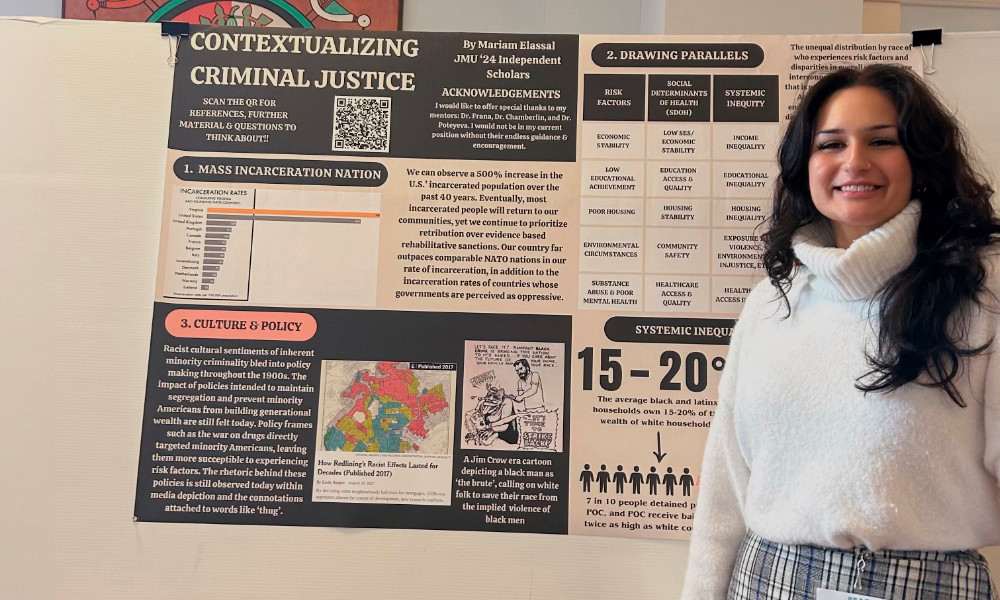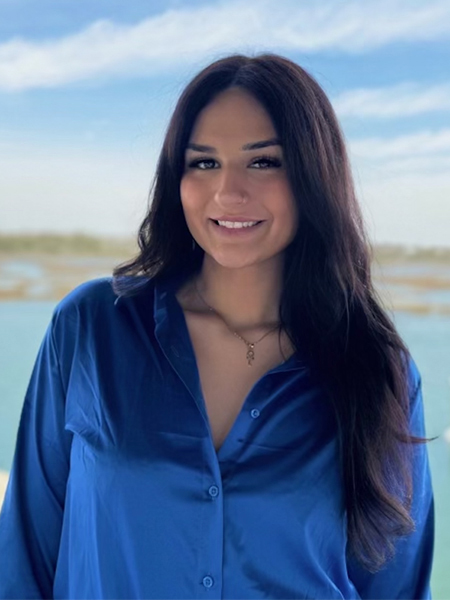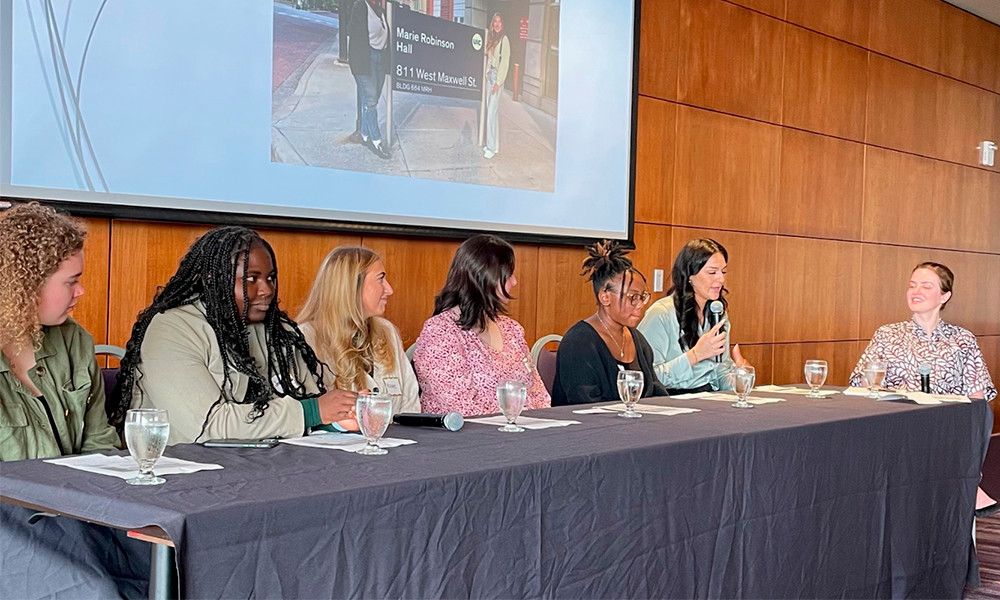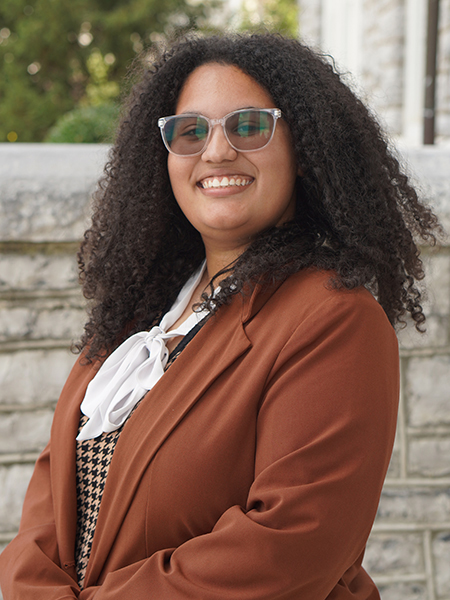JMU’s DIY major
The Independent Scholars program helps Dukes design their own major
Featured Stories
SUMMARY: The Independent Scholars program offers students the opportunity to take control of their college education through the design of a personalized major. Read how two alumni crafted their perfect degrees.
If you look through the undergraduate catalog, you won’t find Neurobiology of Trauma, Dynamics of Social Movements or Native American Narratives listed among the 70 majors offered at JMU. Nor will you see Social Media Entrepreneurship, Political Campaign Management, or Fashion Merchandising and Design.
Yet each of these is a degree program completed by Dukes, and made possible through the Independent Scholars program, which allows students to design their own major.
The Independent Scholars program was born out of the goal of furthering JMU’s competitiveness on the local and national stage. “It was thought that having a self-designed major would make us more competitive and help elevate our profile as an academic institution,” said Dr. Matthew Chamberlin, program director.
|
“Independent Scholars tend to be highly motivated people, with a wide range of backgrounds, skills and aspirations. All our students are really interested and really interesting.” — Dr. Matthew Chamberlin, program director |
Independent Scholars was proposed in 2010 by Dr. Fletcher Linder, now the dean of University Studies. Chamberlin helped design the program, and the two would also partner on the creation of the curriculum, which was approved by the university in 2011. Dr. Phil Frana joined them before the launch of the program in 2015.
Housed under the Department of Interdisciplinary Liberal Studies, the program at its core is dedicated to exploration and designed to help students determine their interests, reflect on their backgrounds and current experiences, and invest in their future plans. Dr. Scott Paulson, academic unit head of IDLS, points to the program’s ability to accommodate the evolving needs of students. “By allowing students to co-create their curriculum with faculty advisors, Independent Scholars fosters ownership of and engagement with their learning,” Paulson said.
Advising is a crucial part of the faculty role. “We begin with advising, and then our students enter our introductory class [IND 200], where they’re grappling with ideas, they’re learning with disciplines … they’re sort of weaving all this together,” Chamberlin said. From there, prospective students propose their research with the expectation that they can properly highlight the interdisciplinary aspects, and, if accepted, are admitted into the major. Each student’s individualized curriculum can pull from any discipline at Madison, and experiential learning is heavily encouraged, allowing students to draw from internship or study-abroad experiences. Critically, faculty across JMU help mentor Independent Scholars students. “Faculty in many programs make it possible for our students to realize dreams that cross disciplinary boundaries,” Chamberlin said.
Although the program offers a large degree of freedom in building the course plan, JMU’s General Education classes are still required, along with required Independent Scholars coursework, including a professional development course, where students are given the chance to present at undergraduate academic conferences, and the completion of a senior capstone project. According to Frana, “the capstone is where we ask students to move with confidence and clarity between past, present and future. They reflect on the knowledge they’ve gained, tackle real-world concerns, and imagine new possibilities through collaboration.”
|
“I feel like the program let me choose so much of what I was interested in, that college just felt like something that I always wanted to do.” — Regan Elmore (’25) |
The program was designed to be small, with only a few new cohorts admitted each year. In 2018, a boost in popularity encouraged it to adapt. “We were getting enough students interested that we decided to open up a section of our gateway courses both semesters, and we have done that ever since,” Chamberlin shared.
After serving as director for 10 years, Chamberlin will step down this semester. “I am still working with the program, but with the addition of four new faculty members, it made sense to move forward with a more democratic faculty organization,” he said. “We’ve been joined by faculty with enormous and varied expertise.” Now advising and teaching in the program are Dr. Michael Klein, Dr. Jared Featherstone, Dr. H Gelfand and Dr. Jennifer Mangan.
Some students are called to the program by a desire to pursue a line of study that directly aligns with their envisioned career path. “[Students] may have plans for the workforce, and this allows students to pursue those dreams with greater control,” Chamberlin said. “[Independent Scholars] want to bring together disciplines and fields of study that are complementary in some way that is not clearly articulated at JMU or made possible in existing pathways.”
Others use the Independent Scholars setting for exploring how to be a better global citizen. “We’ve had a number of students who are really interested in helping and doing good in the world,” Chamberlin said. “They’ll come to us because they want to become a policymaker in education or a doctor or a justice activist or an advocate for children with special needs. We try to help them find ways to learn what they need to, to create the change they envision.”
But Chamberlin is certain that all program participants are united behind the idea of pursuing meaningful work. “Independent Scholars tend to be highly motivated people, with a wide range of backgrounds, skills and aspirations,” he said. “All our students are really interested and really interesting.”
Read how two alumni leveraged the Independent Scholars program to construct their perfect major.
Mariam Elassal (’24), Reforming Systems of Justice

Mariam Elassal (’24) was just two semesters away from field placement in the Social Work program at JMU when life took her in a different direction. She planned to earn her degree in Social Work with a focus on criminal justice policy, but after reviewing her academic requirements, Elassal realized the constraints of the program would prevent her from completing her Youth Justice minor.
“The level of disappointment and grief I felt made me realize that I cared far more about the justice studies and public policy aspect of my future career,” she said. The current undergraduate social work program she was pursuing didn’t offer that focus.
When she shared her disappointment with her roommate, she learned about a program offering study topics that didn’t fit within traditional disciplinary boundaries. Initially this sounded too good to be true.
“In my social work and youth-justice courses, there was a constant image in my mind of arrows connecting the culture of the U.S. from its founding to Jim Crow and the War on Drugs; inequitable policies that produced gaps in access to resources … the punitive approach to the justice system; and the coinciding poor treatment of former offenders,” Elassal said.
“I would talk about it with professors and classmates, but it never felt like anyone saw the gravity of this the way I do. The first time I felt truly seen in this thought pattern was the first time I met with Dr. Chamberlin to discuss why I wanted to create my own major.” Feeling understood and appreciated for her areas of interest, Elassal realized the program would be the right fit.
Her official major is Reforming Systems of Justice, and her curriculum stands on four disciplinary pillars: social work, public policy, sociology and justice studies, each of which played a unique role in her studies.
“Social work gave me the foundation of the advocacy piece, and public policy was important for me to learn because my outlook for justice reform is heavily based in policy change,” she shared. “The sociology portion was key because my thoughts about the justice system … are heavily based in how culture influences systems and vice versa.”
In her senior year, she undertook two massive research projects. The first, her capstone, took her across state borders to Memphis, Tennessee. “My capstone was an incredibly unique experience,” she said. “I led an interdisciplinary group in collaboration with a local, family-resource center director in Memphis to create solutions for the disconnect between the community and the youth-justice system.
“Our understanding of the problem, and therefore our research question, was constantly evolving throughout the semester. Overall, we aimed to create an educational space for stakeholders to connect with one another and explain their perspectives, building empathy and preventing the rollback of policies in their youth-justice system that align with adolescent development science.”

To fulfill her career and advocacy goals, she interned in Virginia with Fairfax County’s youth-justice system as part of her senior project. “It was important for me to gain hands-on experience working within the justice system — to dive deeper into a specific topic that incorporated all of my disciplines and apply the knowledge from both to create this project,” she shared.
During her undergraduate studies, Elassal was also editor-in-chief of The Independent Scholar e-zine — an outlet for Independent Scholars students to share short pieces related to their areas of research during their time in the program. With the help of Frana, Elassal has discussed expanding e-zine submissions to students in similar programs across the country.
Since graduating, Elassal is leveraging her Independent Scholars experience by drawing on the traits it instilled in her. “Designing my own major required significant ambition, initiative and passion,” she said. “I’ve been able to demonstrate these qualities to employers by explaining what the process entailed and how I went to all of this effort because of my belief in a better future for the way we handle crime, and faith that this can be achieved through interdisciplinary collaboration.”
So far, she has sat on several panels and presented her research at numerous conferences and symposiums, including a JMU Board of Visitors meeting. This past summer, she spoke at the Transformation of Youth Justice Symposium in San Diego, California.
Regan Elmore (’25), East Asian Studies

Regan Elmore (’25) knew from a young age that she was deeply fascinated by Asian culture, including a love of anime and K-pop. Parents and peers told her she would grow out of it, but as Elmore asserts, “I never have, and I never will.”
Elmore began her journey as a Duke studying International Affairs. But since its requirements took her outside her area of interest, she wasn’t completely sold.
But at a Majors and Minors Fair after her first semester, she was hooked by the booth that promised to let her design her own major.
Even before taking her first Independent Scholars course, she was sure it was the right choice. “I knew as soon as I could make my own major. I was like, ‘This is it.’ I could individualize my studies in a way that made sense for me.”
Elmore decided to call her major East Asian Studies. She found that even though that specific option wasn’t available at JMU, the name was recognizable and self-explanatory enough for future employers. Her studies focused on combining Korean, Japanese and Chinese culture, and she explored how they have influenced each other as well as where they differ. In her research class, IND 200, she started with the question “What is East Asia?”
“There is so much research and so many people in the field that can’t decide what East Asia is,” she shared. “It is a weird phenomenon of figuring out what the boundaries are.”
Elmore dove headfirst into research, asking questions to help define East Asia’s geographical and historical bounds, and its cultural and language bounds. She took history courses that focused on each country in the region, and numerous Korean language courses.
The rich interconnectedness of turmoil and cooperation among the three countries offered a treasure trove of information for Elmore to unearth in her studies.
Experiential learning is one of the pillars of the Independent Scholars program, and students are finding immersive ways to satisfy that requirement while furthering their own passions. For Elmore, that meant a summer study-abroad trip to Japan on a scholarship provided through the Honors College and the Independent Scholars program. “I’m going to a country that I’ve been studying, and I get to meet these people. I get to hopefully speak the language. I get to eat their food. I get to see the landscape. I get to enjoy the culture. It was kind of like my dream come true,” she said.

Her senior capstone project narrowed her initial question as she decided to more deeply engage with a topic at the forefront of her studies during her summer in Japan — the interaction and distinction between the study of divination and fortune-telling in the country.
Sharing a brief summary of her findings, she highlighted the differences in the practices. “Fortune-telling is based on you as a person and maybe one other person, offering a glimpse into the future, while divination is something that is more used in historical Japan, things that are dependent on a god and their interference in the whole of the country, things like political affairs or the weather.”
In a way, the Independent Scholars experience made college easier for Elmore. Because she had control over her classes, she never had to worry about taking a course for her major that she was not passionate about. “I feel like the program let me choose so much of what I was interested in, that college just felt like something that I always wanted to do.”
Elmore appreciates how the program pushed her outside of her comfort zone, whether she was honing skills in the classroom or attending undergraduate conferences. “They really try to prepare you for the real world outside of college, getting you to practice public speaking and writing skills while also helping you get to know yourself more. I feel like I learned a lot about myself in this major and figuring out what works best for me, what I am interested in and what I want to discover.”
This fall, Elmore finds herself in the James Madison Center for Civic Engagement as a Presidential Engagement Fellow. In this role, she is running the marketing team, where she hopes to use her studies to build a connection with the Center for Global Engagement and international students, building stronger bonds with international universities.
